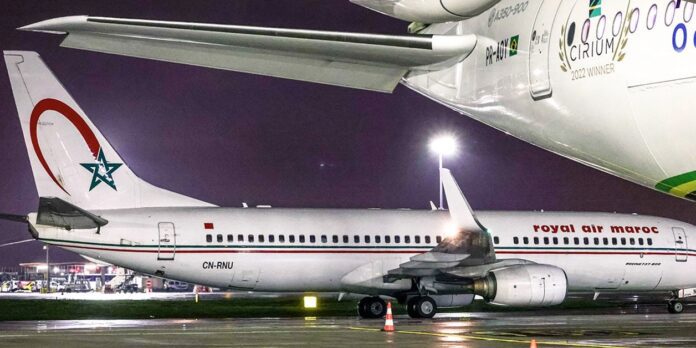After the crisis comes good times. Three and a half years after the start of the Covid-19 pandemic, which caused it to suffer two successive losses of 3.8 billion dirhams and then 2.7 billion dirhams, Royal Air Maroc (RAM) plans to return to profits in 2023, according to its CEO Hamid Addou.
“During the crisis, we didn’t stand by and watch our planes stuck on the runway,” he explains. As proof, he cites the very ambitious program contract signed in July with the government of Aziz Akhannouch, which promises to invest the national company in the vanguard of the airline sector in Africa by 2037.
Among the main promises of this plan is the quadrupling of the RAM fleet – which currently consists of 50 aircraft – to serve 143 destinations (compared to the current 99) and transport 31.6 million passengers. passengers (compared to 7.44 million in 2019). All this for a turnover of 94 billion dirhams (just over 8.5 billion euros).
“More than 80 planes in 2027”
A much more ambitious plan than the one presented – but not adopted – in 2017 by Hamid Addou, who envisaged simply doubling the public company's fleet. “The assessment of demand made in 2017 is not that of 2023. Six years have passed since then and, between what the International Air Transport Association (Iata) predicts and what we see on the ground through different reported data, the needs are not so equal. same. So, five years ago, we were not a member of the Oneworld alliance, thanks to which we recorded additional supply this year”, says the engineer.
That said, and unlike the last program contract signed in 2011, Hamid Addou's new project does not reveal the value that will be injected by the State into the company's capital. According to its CEO, the absence of this crucial information can be explained by the very nature of the new program.
“Obviously we produce very precise business plans year after year but, unlike the old program contract that aimed to resolve liabilities and a situation that was complicated, this one aims to reinforce the pace of investment and the company's growth. If the company generates better results than expected, the financing granted by the State will be lower”, he explains to young Africa.
In any case, the acquisition of the 150 new planes will be financed largely by debt. “This is the capital sport that will vary from one year to another, depending on our results. » In 2023, the public company wants to acquire ten new devices, “seven of which are already secure”. From 2024, its fleet should have 60 aircraft. “In 2027, there The fleet will consist of more than 80 devices with an acquisition rate of around ten machines per year”, explains Hamid Addou.
New lines
To continue supporting the development of the tourism sector, RAM will first reinforce its domestic flights and connect the kingdom's main destinations with their home markets. “It’s about connecting more Moroccan airports without necessarily going through Casablanca. Between 2023 and 2027, we will also plan a certain number of routes for each Moroccan tourist region, such as Tangier, Marrakesh, Agadir or even Dakhla, which is evolving in an extraordinary way”, explains the CEO. In addition to the Paris-Dakhla line, the company plans to launch “at least three other routes” to connect the southern city to European capitals.
Another priority for Hamid Addou: developing the Casablanca hub with, among other projects, the launch of direct flights from Casablanca to Los Angeles and the reopening of the line to Beijing. “In the short term, there are also plans to open a line to Naples and Manchester, starting from Casablanca,” he continues. In the long term, RAM intends to strengthen itself even further on the continent to serve all African capitals. An evolution that Hamid Addou describes as a natural part of the company's history.
“We didn’t suddenly agree and say we wanted to develop the African zone. I remember that we launched our first African route in 1958, one year after the creation of RAM. It’s a DNA that we built patiently, step by step, without superfluous advertisements”, he states. A poorly veiled dig at Air Algérie, which recently placed an order for ten planes to compete with the Moroccan company. “I am happy that Royal Air Maroc is a model for another company on the continent”, he concludes, not without sarcasm, Hamid Addou.

